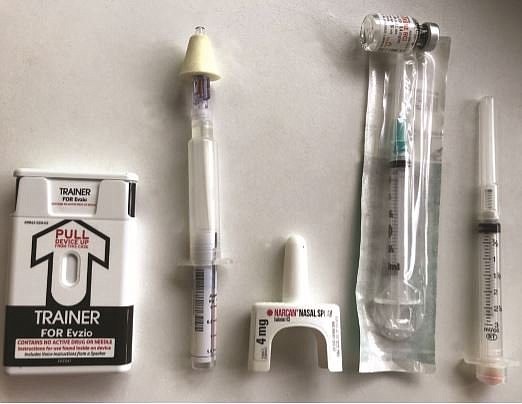Ten years ago this month, Georgia lawmakers passed protections for people reporting overdoses to first responders and opened access to opioid overdose reversal kits.
In the decade since, more than 10,000 overdoses have been successfully reversed in Georgia thanks to naloxone kits distributed by the statewide group Georgia Overdose Prevention, director Andy Gish said.
(READ MORE: Naloxone stopped nearly 2,500 'very preventable' deaths in Chattanooga area in 2023)
Naloxone, available as a nasal spray or intramuscular injection, can block the effect of opioids and restart normal breathing for a person who's unresponsive due to an overdose, according to the Centers for Disease Control and Prevention.
Many people who don't use drugs know naloxone as Narcan, which is a specific brand of nasal spray. But Gish said the intramuscular injection is more popular among people who use opioids because it is gentler and produces less nausea.
There have certainly been more than the reported 10,000 reversals, Gish said by phone, since many people who receive kits don't report when they use them.
"When we started, I had no expectations, but the reality far exceeds anything I could have imagined," Georgia Overdose Prevention co-founder Robin Elliott said in a statement. "The organic spread of the mission demonstrates the passion and need for statewide easy access to harm reduction."
In Northwest Georgia, 1,578 reversals have been reported since 2020, Chattanooga-based harm reduction advocate Robert Childs said in an email. That's after advocates passed out 28,532 naloxone kits in the area, mostly in Dade, Walker, Whitfield and Catoosa counties in that time, Childs said.
Between 2010 to 2020, opioid overdose deaths in Georgia increased by 207%, according to the state's health department.
In Dade, Walker, Whitfield and Catoosa counties, 29 people died of opioid overdoses in 2012, according to health department data. Ten years later, 59 deaths were reported in 2022.
"The opioid epidemic in general has been exponential," Gish said. "It's overwhelming, it continues to be overwhelming, even with all the work that we're doing."
The group has given out around 126,000 naloxone kits since it was founded 10 years ago and has trained around 65,000 people on how to use it, according to a news release. Reversals are reported back to the organization through an online form, phone line and when people pick up.
"Honestly, the true heroes of the story of saving 10,000 people is not me. ... It's not the people in the organization," Gish said. "It's the people who are out there who use drugs, and the people who are newly in recovery and their friends and family that are all saving so many people."
'Don't Run, Call 911'
The 2014 law, known commonly as "Don't Run, Call 911," came in response to rising overdose deaths across Georgia, particularly in areas north of Atlanta, Gish said.
If you are with someone going through an overdose in Georgia, the law means you can call 911 without fear of being charged or arrested for personal drug possession.
Tennessee has a similar policy, often called a "good Samaritan" law. But in Tennessee, you are only guaranteed protection the first time you call for help on an overdose — after that, it's up to the first responders' and prosecutors' discretion whether they want to bring charges. That means people don't know what to expect when they call for help and may delay or decide not to call at all, Childs, the Chattanooga-based advocate, previously said.
"There are people I work with who have been reversed 50 times," Gish said. "And they are in recovery and doing amazing work. If one of those times somebody had been too afraid to call for help, then that person wouldn't be here. We have to give them every chance."
Gish said there's still a lot of stigma around opioid use but that it's much better than it used to be. Naloxone being available over the counter has helped people talk about overdose more openly, she said.
"It's still an uphill battle," Gish said. "But definitely, I see more places open to carrying it, open to talking about it, very much unlike 10 years ago."
Many police officers in Georgia have started carrying naloxone in recent years, she said.
"Before — I would say even six years ago — you would have some police departments saying, 'I'm not doing that,'" Gish said.
In 2022, a post-overdose response team program started thanks to grant money in the state health department's Northwest District, which includes Dade, Walker and Catoosa counties. After a reported overdose, a team from local recovery organizations goes out and canvasses the area where it happened with resources and educational materials, Rewa Pressley, the district's emergency preparedness coordinator, said.
"People were just so overwhelmed because it broke down so many barriers," Pressley said by phone.
Many of the volunteers on the team are in long-term recovery themselves, Pressley said.
"They're able to then go into a neighborhood and say, 'I was there. I was you,'" she said.
Contact Ellen Gerst at egerst@timesfreepress.com or 423-757-6319.
